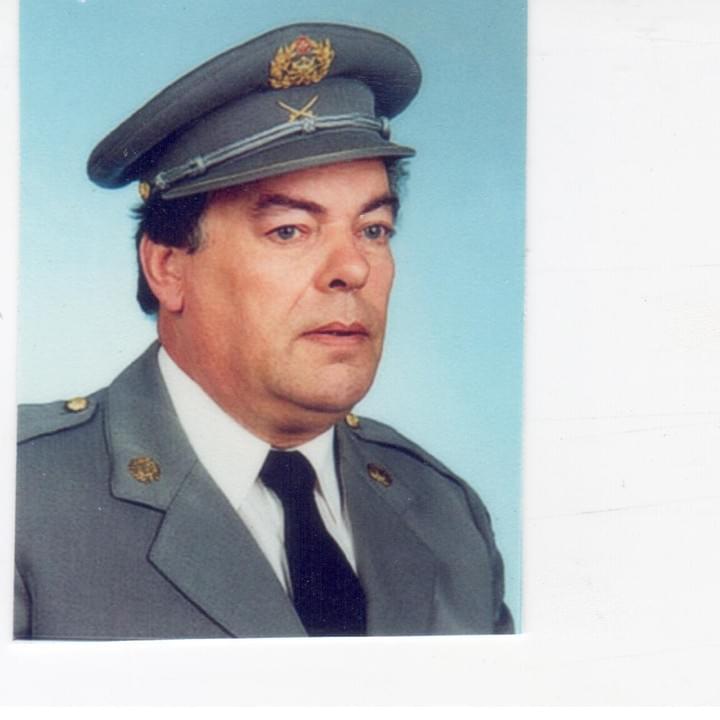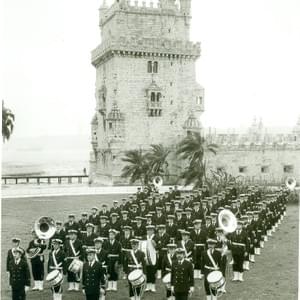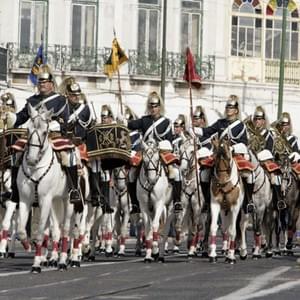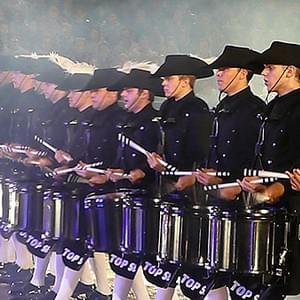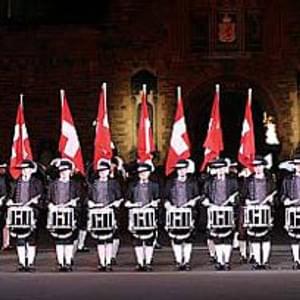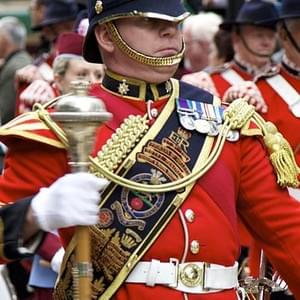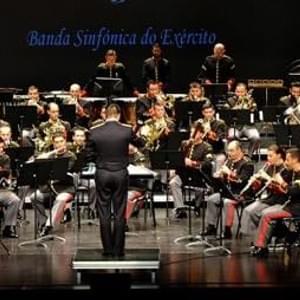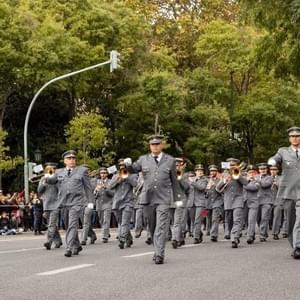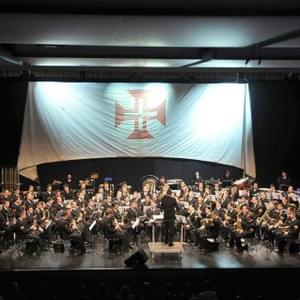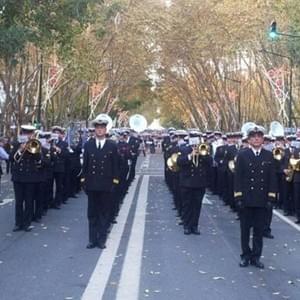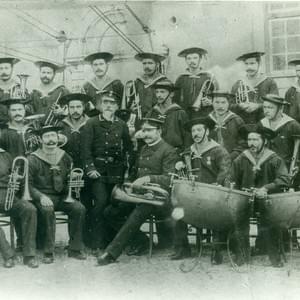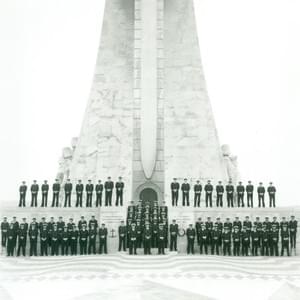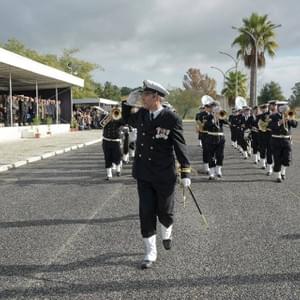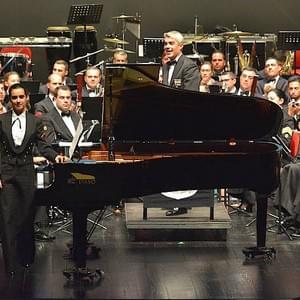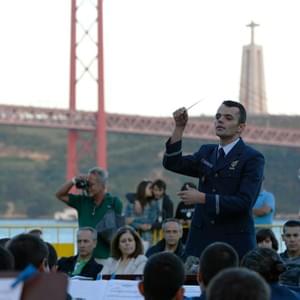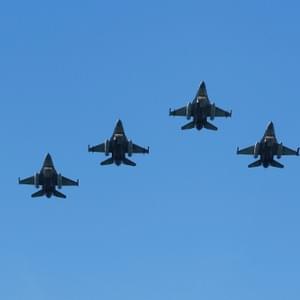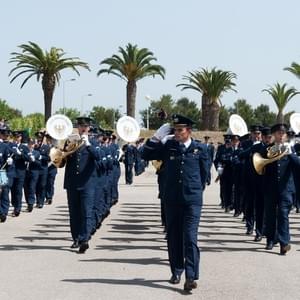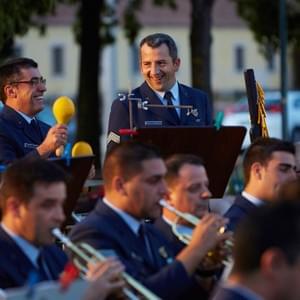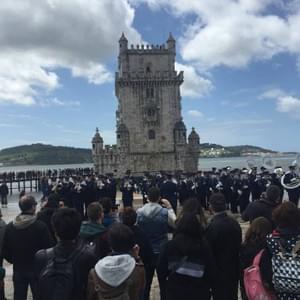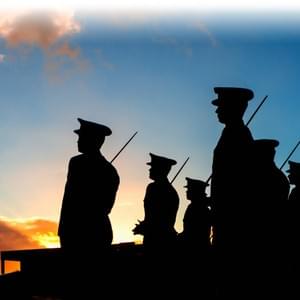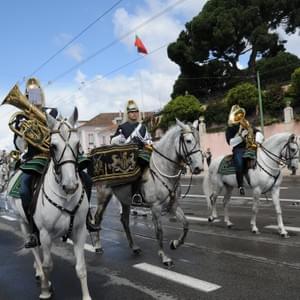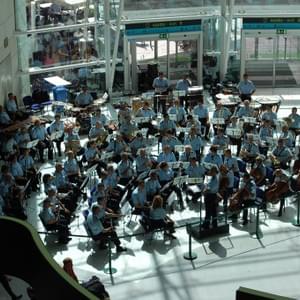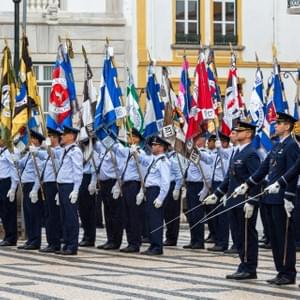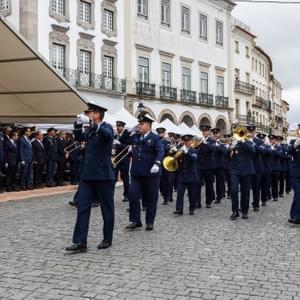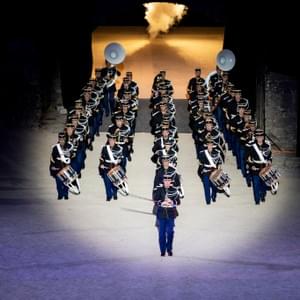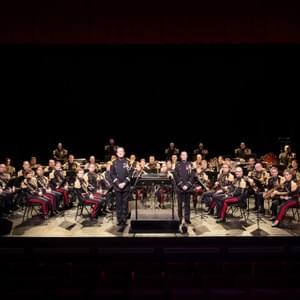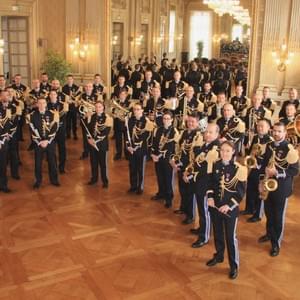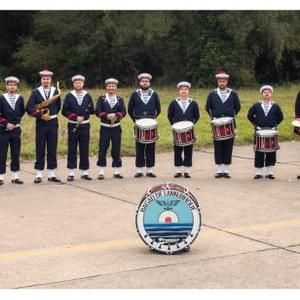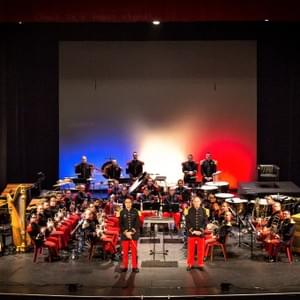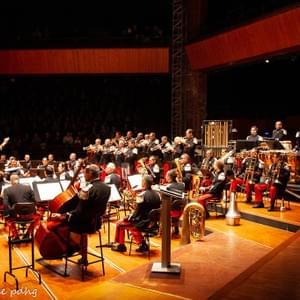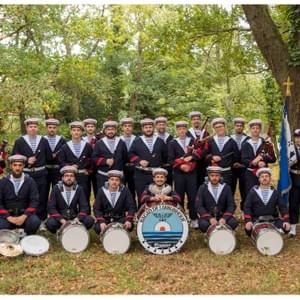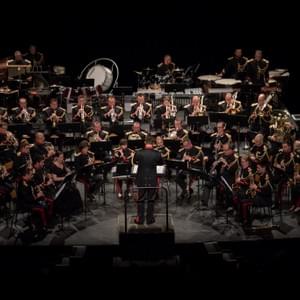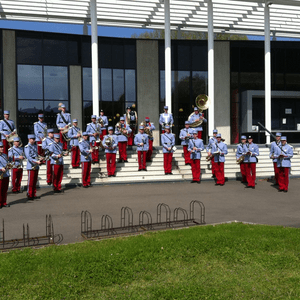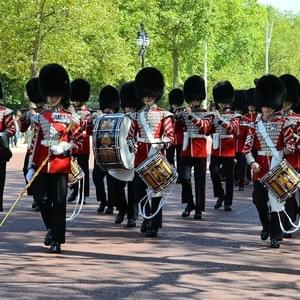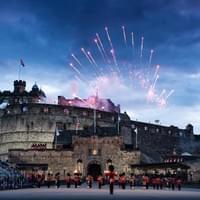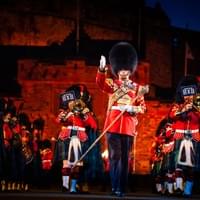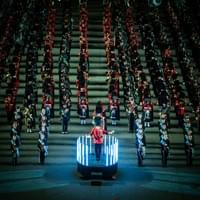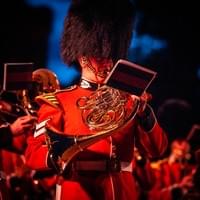

International Military
Music Society
International Military
Music Society

It is my privilege and pleasure to introduce and welcome our new international website, with many thanks to our webmaster Nuno Miguel Silva for creating it. As the world’s leading military music appreciation organisation, we are always keen to share with others around the world our special interest in the splendour and traditions of military music, and this website is a major element in achieving that. I should perhaps add that it is in the process of being re-built and I am confident will be enhanced over the coming months.
Please surf the pages and absorb the different scenes and information of our many member countries. From these you will see that, despite constant economic challenges, military bands and their splendid music are alive and well, supporting a wide range of ceremonials and entertainment, as they have done in their unique way for hundreds of years.
Membership is open to anyone who shares our love of all that is great about the many aspects of military music, whether you are a musician or, like me, simply an enthusiast, and it is very inexpensive to join us - in most cases less than the cost of two CDs. We hope you will contact your national IMMS representative, or simply write to the International Chairman, to enrol as a member and receive our excellent ‘Band International’ magazine mailed to your home three times a year - and join our network of fellow members around the world.
BOB DAVIS
International President, Auckland, New Zealand, August 2019
WELCOME TO IMMS!
What is IMMS?
The International Military Music Society is an organization for people who are interested in military bands, their music and history.
The aims of the Society are to encourage interest in all aspects of military, brass, concert, symphonic, percussion, pipe, choir and youth bands and wind ensembles of the world.
The society´s 1300 members come from 32 countries. Their activities cover a wide variety of interests ranging from history, instrumentation, uniforms, repertoire, conductors, recordings, military tattoos, films, videos and a myriad of other special projects or interests which all have their basis in the military bands of the world.
So whether you are a historian, a Cd collector or just someone who likes to listen to a stirring march then for a modest fee the IMMS has much to offer you.
The Society is open to any person.
About
Military Music
"Instrumental music associated with the ceremonies, functions and duties of military organizations. The function of military music was threefold: to give signals and pass orders in battle; to regulate the military day in camp or quarters; and ‘to excite cheerfulness and alacrity in the soldiers. Military music in the form of bugle and trumpet calls together with drum beatings could identify friend or foe before the general adoption of national uniforms.
The drum and trumpet, and latterly the bugle, were introduced to solve the problem of control in battle once armies had grown too large for control by the human voice to be effective. With the advent of the all-weather metalled road, it became possible for the large-scale movement of formed bodies of troops to be planned and performed to a timetable. For this a uniform and even marching beat was required and the military band, consisting of brass, woodwind (mainly reed) and percussion instruments, was evolved, supported by the drum and six-keyed flute (corps of drums) combination, and in Scottish regiments by that of the drum and bagpipe. This role has now disappeared with the increasing mechanization of modern war.
Before the days of radio and television military bands could be employed to project a positive image of the military in their relations with the civilian population, and were so used in the war-time recruiting campaigns that were a feature of the ‘nation in arms’ concept. This aspect has diminished in scope and appeal with the progressive reduction of armed forces, and today military music is only heard in connection with ceremonial occasions and, rarely, in public concerts given by service bands, while the use of music on the field of battle has been obsolete since the conclusion of the South African War of 1899–1902. (Pipers were used in World War I to play on the line of march to and from the trenches: the practice of playing attacking troops ‘over the top’ was stopped early on due to the high casualties among pipers.)
This article discusses the origins of European military music, and especially its use in Britain and North America. For more detailed discussion of the history, instrumentation and repertory of military bands, see Band (i); see also Feldmusik and Harmoniemusik; for military calls and signalling, see Military calls; Signal (i); and Tuck Tucket."
In Grove music
IMMS Representatives
By country, including websites where available

AUSTRÁLIA
Lieutenant Colonel Tony Sillcock CSC LTCL Retd
65 Chevalley Loop
Gordon, ACT 2906, Austrália
+61 (0) 2 6294 2781 (Phone)
e-mail: tonysillcock@optusnet.com.au


BELGIUM
Kris Schauvliege
Av. J. Bordet 68 - B46
B-1140 Bruxelles (Evere), Belgium
http://immsbelgium.wix.com/immsbe
https://www.facebook.com/IMMSBELGIUM
email: kris.schauvliege@yahoo.fr



Denmark
Wedell Christensen (National Representative)
email: wedell@lic-mail.dk

Finland
Lt. Col (music) Jyrki Koskinen, Our colleague representing South Korea has just passed away, in due course we will have his successor.
Our condolences to his family and friends.
email:

France
David Minois






South Korea
Bae Ghi Ho, Our colleague representing South Korea has just passed away, in due course we will have his successor.
Our condolences to his family and friends.
email:













Direction


Chairman IMMS
Dr Saad Khan
Pakistan - saad.s.khan1@gmail.com

Vice Presidents
Major (Ret'd.)
James R. Milne OMM CD
Canada - bytownbrass@sympatico.ca

France Representative
David Minois
France - presidentimmsfrance@sfr.fr
Maj E Hammerbak
Denmark - hammerbak@heliosmusic.dk
Frans Van der Walle
Netherlands - f.vanderwalle@compaqnet.nl
W/O Denis Spurdle RNZAF
New Zealand - Denis.spurdle@nzdf.mil.nz
Arne Halvorsen
Norway - arne.gausdal@gmail.com
Capt - kenneth R Force
USA - forcek@usmma.edu
Treasurer
Mr Peter Holt
New Zealand - peter.mary.holt@xtra.co.nz
Editorial Committee
Kris Schauvliege
Belgium - kris.schauvliege@yahoo.fr
BI Distribution
Rodney Illsley
Rodney Illsley - r.illsley@yahoo.co.uk
Webmaster
Nuno Miguel Silva
Portugal - immsportugal@gmail.com
Public Relations
Johanna Lundgren - johannarlundgren@gmail.com
International Committe
Lt Col Tony Sillcock - tonysillcock@optusnet.com.au - Australia
Kris Schauvliege - kris.schauvliege@yahoo.fr - Belgium
Wayne Primeau - wayneprimeau@sympatico.ca - Canada
Wedell Christensen - wedell@lic-mail.dk - Denmark
David Minois - presidentimmsfrance@sfr.fr - France
Lt Cdr Yoshio Higuchi - tbn-co@inet.msdf.mod.go.jp - Japan
Geert Bergsma - amsgreb@gmail.com - Netherlands
Bob Davis - immsnewz@gmail.com - New Zealand
Ole John Andeng - ojandeng@gmail.com - Norway
Nuno Miguel Silva - immsportugal@gmail.com - Portugal
Lt Col (Ret´d) Geoff Kingston - gkingston@safemusic.demon.co.uk - United Kingdom
Steve Rosenstein - chairmanimms@juno.com - USA
IMMS WORLD BANDS






La Musique de la Police Nationale - France

Portuguese Navy Band
Symbol of the Navy’s professionalism and cultural excellence
A - The Navy Band
All of us associate the Navy Band to our military career’s most symbolic moments.
In our memory there also are present concerts and other musical presentations, which take the “adventurous sailors” all over the country, turning the Navy Band in one of the Navy’s ambassadors all over the country.
The Navy Band men and women do not embark, but are one of the Navy’s most visible faces and from those whose are “always the first on land and sea”.
A1 - The Band’s History
Over more than five hundred years of musical formations existence in the Armada, these ones suffered numerous alterations, since the designation to the number of elements which constitute them, turning the enumeration practically impossible.
In fact, the historic sources only are reasonably safe, under this matter since the first half of the XVIII century, and indicate that in August of 1740 it existed a band named “Charamela” in the Royal Armada.
On 3rd April 1903, the Armada Sailor’s Band records, at the Sailors Corpus Barracks, in Alcântara, which is considered the first record produced in Portugal, a pretty rare historic and phonographic document. The cover contains the royal seal and the inscription “Offer to the King D. Carlos from the Maestro António Maria Chéu”. The record made by The Gramophone and Typewriter Ltd from London , pretended to celebrate the visit to Portugal of the King England Eduard VII, through the perpetuation of one of the most notorious musical works relative to the national identity , the “Cantos Populares Portuguezes n.º 2 ” of Rodriguez.
Fruit of the effort of renovation and dinamization carried out in the last years, the results reflect themselves into the great value and national and international visibility of its live actuations and constant CD`s record and edition. In fact, over the times various compositors of recognized merit and some of the best Portuguese instrumentalists have belonged and continue to appear in the Navy Band, many of whose with high education and an average age of 33 years. The future comes, because of that, impregnated with hope and determined will of perpetuate and dignify the country’s cultural legacy through music.
A2 - Values, Identity and Memory
Symbol of the Navy’s professionalism and cultural excellence
“ … And soon it began to sound four or five flutes … And the Capitão-mor ordered to play the trumpets, and we were dancing inside the boats, and also the Capitão-mor danced back with us from Vasco da Gama’s Diary.
Over more than fifty hundred years of musical formations existence in the Armada, these ones suffered numerous alterations, from the designation to the number of elements which constitute them, turning practically impossible one exhaustive numeration, also because of the reliable information´s manifestly absence.
In fact, the historical sources only are reasonably safe about this matter since the XVIII century ´s first half, and indicate that. On August of 1740, it existed in the Royal Armada a music named “Charamela”. It´s appearance coincides with one of the Portuguese music gold periods, in which the Queen D. Maria I Chamber´s Orchestra was only supplanted, in dimension and quality, by the Pope´s one. From the first maestro which it has historical memory, Caetano Tozzi, it is only known that he was Italian and musician of the Royal Chamber.
On 27th November 1807, during the Napoleonic invasions, the Navy’s Royal Brigade Band accompanied D. João VI and the Royal Family on its withdrawal to Brazil. It has the Italian Pascoal Corvalini as regent. In 1821 when the sovereign returned to the reign, it only turned back two musicians, having the remaining been integrated in the Brazilian Armada, created by D. Pedro. In 1863, the Charanga, constituted by 27 executants and directed by Arthur Reinhardt, accompanied D. Fernando II to Bordeaux, aboard the “Mindelo” Corvette. Is of this monarch responsibility the maestro’s Mark Holzel came to Portugal, which passed to be responsible for the direction of 20 musicians of the Navy’s Battalion.
In 1922 the Armada’s Sailors band integrated the official voyage of the President António José de Almeida, aboard the “Porto” ship, to participate on the Brazilian Independence 1st Centenary. They were realized diverse concerts at Rio de Janeiro, with resounding success of the public and critic, being chief the lieutenant commander Artur Fernandes Fão. During the 35 years of its regency (1920-1955) the Armada’s Sailor Band is mentioned in multiple Laws and Decree – Laws, which invocate diverse restructuring, including the designation, the composition, the admission form and the musician’s salary adjustments.
Many were the Armada’s ships which made use of charangas and fanfares. An example of this is the 1955’s trip to India, aboard the “Bartolomeu Dias”, in which it highlights the charanga actuation in the parade of honour to Afonso de Albuquerque, in Damão. This travel was immortalized in the Urbano Tavares Rodrigues magisterial description, in the book “Jornadas no Oriente”. In the memory of many ones, it was also the musical set “Os Náuticos” that, on the beginning of the 70’s decade, acted to the parked military forces at the ultramarine provinces. Along almost two years going through Guinea, Cape Verde, Angola and Mozambique, on many digressions aboard the merchant ship “Vera Cruz” and in naval units.
At the beginning of the 80’s decade, under the direction of the lieutenant-commander Manuel Maria Baltazar (1976-1987), the Navy Band won a consistent visibility next to the civil society, verifying its deserved inclusion in the country’s best band groups. The systematic contact with the great public was the beginning of a long succession of plenty rooms and extraordinary innovations, giving the Navy prestige through the virtuosity, dedication and talent of its musicians. In the next decade, now with the lieutenant-commander José Joaquim Araújo Pereira as maestro (1987-2006), it has undertaken various dislocations cross the country and foreign territories, all of them full of success. There are detached the actuations across France, by the occasion of the 5th Azaleas International Festival. In 1998 it has acted at the IPO´s Diamond Wedding and in diverse events under the Expo 98´s scope, among which two concerts were apotheotic ally applauded by thousands of people. Already under the command of the lieutenant-commander Carlos Silva Ribeiro (2006-2010) there are detached the actuations of the 44th Musikschau der Nationen in Bremen – Germany, as well as on the “Festa da Primavera” integrated concert realized at the CCB’s large auditorium.
In all the concerts, the Navy Band highlighted the Portuguese music, demonstrating its public service vocation and a fundamental role in the national musical tradition preservation. Because of that, in 1999 it was conceded the Gold Medal of the Distinct Services by the CEMA Admiral. On its praise he demarked the “notable role, exemplary dedication and well serving will, thanks to the musician’s professionalism and excellence, from whose it has come brightness, honour and prestige to the Navy”.
Since 2010 the Navy Band direction is under the charge of the lieutenant-commander Délio Alexandre Coelho Gonçalves , who in the line of his ancestors , has conducted it through high quality and efficiency patterns, executing attractive and of well recognized technical quality programs , obtaining significate successes and raising the most alive and warm audiences enthusiasm .

Portuguese National Police Symphonic Band
B - The Portuguese National Police Symphonic Band, as an organic group of the Portuguese National Police (PNP), assumes its historical origin in the creating process of a police force in Portugal.
If the first force of police officers was created by D. Fernando I, the so-called "Quadrilheiros", in 1383, the origin of the Band, had to count another four and a half centuries, for its appearance.
In the historical course of the police institution, in an attempt to respond to the necessary maintenance of order and public peace, many are the "Resolutions and Laws" that create, extinguish and overlap police agencies.
It is with Pina Manique that the General Police Intendency achieves public recognition of its actions in the fight against crime, and as a result of the reorganization of services, the Royal Police Guard is founded on December 25 th, 1801, an institution that will host in its effective the first military band in Portugal.
From this date, many military institutions take as their own the model of the Royal Police Guard Band. As Albino Lapa points out, "[...] was the first armed military organization that existed to maintain public security [...]" and "[...] Given the greatness it owned, it could not stop having a Band [...] that had its headquarters on the Costa do Castelo [...]" ; it is then clear that this model arises in a police context of peacekeeping and public orders, which is why the Portuguese National Police Symphonic Band exudes the historical scrolls of the Band of the Royal Police Guard.
Over the years, the result of policies and conveniences typical of the times, the police forces are undergoing changes in their organization: extinguishing some, creating others, overlapping even.Walking the path of time, we witnessed the creation and extinction of the National Guard (1823, associated with the Liberals), the Lisbon and the Porto Municipal Guard (1834, the last force to surrender at the hands of the Republicans) and we are close to the Civil Police Corps, created by King D. Luís, on July 2th, 1867, an institution that lays the foundations for the creation of the current Portuguese National Police.
In this tangle of police institutions, paradoxically convergent in the objectives, music was the element always present. Therefore, in 1925, Captain José Esteves Graça, serving in the Lisbon Civic Police, takes over the conducting of a group of musicians from, this institution, thus forming the Lisbon Civic Police Corps Band. In 1927 the Lisbon Civic Police adopted the designation of Polícia de Segurança Pública (Public Security Police), always continuing the Band to be part of its organic, existing one in Porto and another in Lisbon. By this time a musical ensemble is also created in Madeira. In the Porto Metropolitan Police Command the Band continues to operate, however in the Madeira Regional Police Command there is no longer musical group in its effective.
Between 1927 and 1950 under the leadership of Captain Armando Fernandes the Band develops its artistic level to the point of obtaining the first prize in the military marches’ competition, held in 1936 by the Portuguese National Broadcasting.
Interestingly, in 1951, the Macao Police Corp created its Music Band, consisting of two dozen non-professional musicians, at some point run by priests with music knowledge, the last band with these characteristics in Portuguese overseas territory.
In the period from 1959 to 1969, it is up to Alferes Álvaro Sousa to conduct the artistic work, being succeeded in this design by Captain Pinto Rodrigues, who remains in duty until, in 1979, Major Silvério Campos takes charge, in what will be the new historical, artistic and institutional phase of the Police Symphonic Band.
On April 28, 1981 with the Law 88/81, the Police Music Band is officially constituted, and subsequently the rules of permanent execution are defined, in NEP published in OS No. 129 (I Part) of August 10, 1982,, and, recently with Ordinance No. 290/2015, of November 15.
With the symphonic character, the Band follows the paths of institutional recognition, affirmed by the complimentary references granted by The General-Commander General Monteiro Pereira, on July 7th, 1994 and by the President of the Republic, Dr. Jorge Sampaio, on November 29th, 1996, praises awarded by the General- Commander on December 18th, 1995 and on December 18th, 1996 and by the Commander of Staff, on January 10th, 2013, and by its artistic success, acting on the most distinguished stages, at home and abroad.
It was the first Band belonging to the Portuguese Security Forces and Armed Forces to admit female elements in their ranks.
At the time of the celebrations of the 128th anniversary of the International Red Cross, it is awarded with the diploma and medal of thanks for the "spontaneous and valuable cooperation" provided to this institution. It is also "Benemérita de Honra da Ordem Hospitaleira em Portugal e das Celebrações Culturais do V Centenário do nascimento de S. João de Deus”.
Internationally, it represented the country and the Portuguese National Police, in 1997, at the "7th International Band Festival", in Saumur, France, and, in 2000 participated, in the "5th International Band Festival" held in Saint- Étienne, acting for a group of melomans that filled the Massenet theater.
Since its officialization were Conductors of the National Police Symphonic Band Major Silvério de Campos, Subintendent Ernesto Esteves and Deputy-Commissioner Alberto de Freitas.
The Symphonic Band of the Public Security Police, young in character and mature in the scrolls, bringing its historical origin, has always reflected an avant-garde position in portuguese artistic movements.
Her interaction with society and academia led it to be a pioneer in many of the activities carried out throughout its history. In this measure, it pioneered the regular recording of audio media for domestic and foreign publishers; in the performance of concerts with the participation of renowned national and international concert soloists; in the invitation to conductors (recognized nationally and internationally) to conduct in concert, collaborating with academies and universities in carrying out training activities, in band direction, in the training of students of the band conducting courses (participating in the defense of their thesis); in the invitation to young composers to write for the band; and in collaboration with musicians and artists of various musical genres, ranging from fado to rock and to jazz.
For some years now, it has been active, the "The National Police Brass Band", having presented itself in the most varied protocol situations and in the most diverse presentations of different characteristics, covering various age groups. It promotes the Palmo & Meio Concerts®, aimed at an audience whose age range sits from six months to six years old. The "The National Police Chamber Trio" participates in several protocol ceremonies, in collaboration with the Presidency of the Republic and the Ministry of Foreign Affairs. It is also part of its effective, a "Piano and Voice Duo" that participates in events of a varied nature. It has recorded 12 CDs for the Dutch label "Molenaar".
It develops several activities inserted in the noble mission of the Police Proximity Program, the "Safe School" and the "Elderly in Security". It participates in different social solidarity initiatives.
With an atmosphere of constraints imposed by the realities in which it is inserted, the Portuguese Symphonic Band, has a cadre of musicians of high artistic, academic and professional training, coordinated, since 2009, by the current Chief in Office and Artistic Director Subintendent Ferreira Brito, to continue to serve the Portuguese National Police and Portugal.
Conductors
By band

Adjudant-Major chef de musique
Bjorn Verschoore
Born on 22/07/79 in Izegem, Bjorn Verschoore studied saxophone at SAMW in Izegem and was admitted to the Royal Conservatory of Brussels where he graduated in 2002 with the "Master of Music" diploma with great distinction in the class of Norbert Nozy. In the meantime, he studied at the Real Conservatorio Superior de Musica of Madrid (Es) with MM Mijan during the 2000-2001 academic year and followed several masterclasses in Belgium and abroad with François Daneels (B), JM Goury Claude Delangle (FR), Arno Bornkamp (NL).As a saxophonist active in classical music, jazz and light world music, such as: Brussels Philharmonic (Vlaams Radio Orkest), Flanders Symphony Orchestra, Philharmonie, Marinierskapel (NL) and the Mint. He has also performed several recordings on television and radio. Since 2000, he has been a saxophonist with the Royal Navy Music where, in 2006, he was awarded first soloist. Three years later, Bjorn successfully passed the adjunct music master's exams. He is officially a music master since January 4, 2010.

Commandant chef de musique
Matty Cilissen
While in the humanities (Latin-Math), Matty Cilissen learns flute, piano and chamber music at the Eisden-Maasmechelen Music Academy.He continues his musical training superior to the Royal Conservatories of Brussels, Ghent and Antwerp, Maastricht as well as the Lemmens Institute of Leuven where he follows the management courses with François De Ridder, Jan Cober, Norbert Nozy, Jan Hadermann, Dirk Brossé and Jan Van der Roost. He also attended flute lessons -piccolo with Gaby Van Riet and Wim Tonnaer. His studies will lead to 4 Master's degrees. At the same time, he is studying the history of music, orchestration, percussion, 20th century musical analysis, harmony, counterpoint, chamber music and musical philosophy.In November 2004, Matty Cilissen obtained a master's degree in conducting (cum laude) at the Maastricht Conservatory and in 2005, cum laude conducting at the Lemmens Institute in Leuven. He completed his training with the master classes of Yvon Ducène and Jorma PanulaAt the same time, he is guest conductor of the National Orchestra of Belgium, the Royal Music Guides, the Symphonic Factory, the group New Brass Directions, the Netherlands Symphony Orchestra, the Royal Music of the Netherlands, the Dutch Defense, the Blaskerphilharmonie of South West Germany and the Leipzig Rundfunkblasorchester (DE) and the Belgian Brass. To this is added the direction of the conservatory orchestras of Antwerp, Louvain, & c.He directs the CD recording with the Grand Orchester d'Harmonie Sainte Cécile of Eijsden, in the Netherlands, the Bläserphilharmonie of South West Germany, the Belgian Marine Music and the Rundfunkblaserorchester Leipzig (Germany).From the beginning of his career, Cilissen developed a certain reputation as a conductor of wind ensembles. He has won several competitions such as Kerkrade's World Music Competition, TEMA Tielen Light Music Competition, Certamen de Altea (Spain) etc.In 2006-2007 he coached the woods section of the Netherlands Symphony Orchestra (NJO), where he assisted e.a. Reinbert de Leeuw and Mark Wigglesworth.Member of the jury of the Vlamo Provincial and National Technical Commission, Cilissen is also regularly invited to various international competitions.In 2007, after having successfully passed the Belgian Chief of Music Officer (he obtained the best artistic results), he was commissioned to the rank of Chief of Music of the Royal Navy at the end of 2008. In the process, he became Head of the Philips Wind Symphony Orchestra in Eindhoven (succeeding Pierre Kuijpers).Since January 1st, 2010, Matty Cilissen is Chief of Music of the Royal Band of the Air Force at Beauvechain

Délio Gonçalves (Portugal)
The Navy Band - PORTUGAL
Lieutenant-commander Délio Gonçalves
Born at Azambuja, where it has started his musical studies first in clarinet with the Maestro João Teófilo, and later in bassoon with the Professor Carolino Carreira. In 1990, he has done the Orchestral Techniques Course to Bassoon’s Wind Players at Menendéz Pelayo University with a scholarship of the same university, which would become to reveal fundamental in this option and decision of embracing an artistic career. In 1991, after the national competition, he joins the Portuguese Navy Band where he played 1st Bassoon functions. In 1992, he joins the Almada’s Professional Music School, where he continued and finished his bassoon studies with the Professor Carolino Carreira. When being a young musician , he cooperated with the Country´s Young Orchestras , and professionally with an intensive activity , he worked with the most variated groups , he recited alone , and played in concerts with numerous and diverse chamber musical groupings. In 2001, he finished his studies in band Direction, Fanfarra and Brand Brass, at the Maastrich’s Royal Music Conservatorium in Netherlands, where he studied with the professor Jo Conjaerts. Nowadays it´s activity is focused in direction, working not only with musicians and professional groups, but also teaching in musical Internships and Workshops, and collaborating with the major diverse musical events, in Portugal as much as in the abroad. He mentors and organizes some important events in our country as the case of the S.I.M.P.S Direction Workshop, and of the S.F.U.P Direction and Amateur Musicians Workshop at Faial Island (Azores), and of the International Contest of Amateur Bands of Vila Franca Artistic Athenaeum. Today, with the lieutenant-commander charge, Délio Gonçalves is the Portuguese Navy Band Maestro Chief.
The Délio Gonçalves Commander received various awards and praises: a medal of Distinct Services (Silver Grade), four medals of the Naval Cross (2nd and 3rd Class) and the Exemplar Behaviour Medal (Silver Grade).

Colonel Jason K. Fettig
Colonel Jason K. Fettig is the 28th Director of “The President’s Own” United States Marine Band. He joined in 1997 as a clarinetist and soon became a frequently featured soloist with both the band and the Marine Chamber Orchestra. After serving four years in the organization, he was selected as an Assistant Director, and he conducted his first concert with the Marine Band Aug. 1, 2001. He was commissioned a first lieutenant in July 2002, promoted to captain in August 2003, and became the band’s Executive Officer the following year. He was promoted to major in August 2007 and to lieutenant colonel in July 2014, one week before assuming leadership of “The President’s Own.” He was promoted to his present rank in August 2017 in the Roosevelt Room by President Donald J. Trump. He is the third Director of “The President’s Own” to be promoted to colonel in a White House ceremony.
As Director, Col. Fettig is the music adviser to the White House and regularly conducts the Marine Band and Marine Chamber Orchestra at the Executive Mansion and at all Presidential Inaugurations. He also serves as music director of Washington, D.C.’s historic Gridiron Club, a position held by every Marine Band Director since John Philip Sousa. In his first years as Director, Col. Fettig has led the band for numerous major national events both at the White House and throughout the country. He conducted national broadcast performances for the 200th Anniversary of the Star Spangled Banner at Ft. McHenry in Baltimore, a special Veterans Day performance with the Mormon Tabernacle Choir in Salt Lake City, and an appearance on the David Letterman Show at the invitation of Michelle Obama in New York. He leads frequent concerts throughout the Washington, D.C., area and across the country during the band’s annual national tour. Live performances by the Marine Band under his direction are often heard on National Public Radio. Col. Fettig is a fervent advocate for both traditional and contemporary American music and remains dedicated to the ongoing development of music for wind band. In recent years, he has conducted world premières of substantial new works by James Stephenson, Jacob Bancks, David Rakowski, Adam Schoenberg, David Conte, and Narong Prangcharoen.
Throughout his career with the Marine Band, Col. Fettig has been deeply committed to music education and has taken an active role in the evolution and expansion of the many educational initiatives of “The President’s Own.” In addition to helping refine the Music in the Schools and Music in the High Schools programs, he has made it a priority to maintain a significant presence in schools throughout the nation during the band’s national concert tours. He also began an interactive and theatrical Young People’s Concert series in 2006 and authored, hosted, and conducted this popular annual event until 2015. In 2014, shortly after assuming command of the Marine Band, Col. Fettig launched an ambitious project to re-record all of the marches of John Philip Sousa and provide free performance and educational materials online to schools throughout the world.
Col. Fettig is a 1993 graduate of Manchester Central High School in New Hampshire and holds two bachelor’s degrees from the University of Massachusetts, Amherst (UMass) in both clarinet performance (1997) and music education with an emphasis in conducting (1998). In 2005, he earned a master’s degree in orchestral conducting at the University of Maryland, College Park (UMD) where he served as assistant conductor for two productions of the Maryland Opera Studio. He studied clarinet with Michael Sussman and David Martins, and his principal conducting teachers were Malcolm W. Rowell and James Ross. Additionally, Col. Fettig has participated in workshops with several renowned conductors including Osmo Vänskä and Otto Werner Mueller.
Col. Fettig has represented the Marine Band on numerous occasions as a soloist, adjudicator, and clinician, and regularly conducts both concert bands and orchestras for all-state and honor festivals. In 2014, he was elected as a member of the prestigious American Bandmasters Association.

Lieutenant José Veloso (Portugal)
The Navy Band - Portugal
Deputy Chief of the Navy Band
LIEUTENANT JOSÉ VELOSO
Born in Lisbon, where he began his Musical studies with Mário Cândido and Inácio Santos. In 1990 joins the Music School of the Lisbon’s National Conservatory, at the professor’s Jaime Carriço class. In 1991, after the national competition he joins as clarinetist in the Portuguese Navy Band. In 1996, he joined the Lisbon’s Superior College of Music, where he studied Clarinet with the Professor Manuel Jerónimo and Chamber Music with the professors Jorge Moyano, Irene Lima and Olga Prats, where he concluded his studies in the year of 2000. In parallel, he proceeded clarinet studies in Portugal and abroad with the professors Alois Brandhofer, Anders Aberg, among others, also having collaborated and took part of the Corsi de Perfezionamento Musicale of the Wind Orchestra directed by the Maestro Jo Conjaerts in Spilimbergo Itália, on which he directed some concerts in many of the North Italian localities. In the years of 2005 and 2006 he studied at the Netherlands (orchestra and band direction), with the professor Jo Conjaerts. In the year of 2006, he gave public examinations to the Navy’s Official Musician charge. Having later joined the Officials Complimentary Military Formation Course, after which he was promoted to sub lieutenant’s charge. Actually, in the lieutenant charge he operates as the Deputy Chief of the Navy Band functions. In parallel with his military career, he also develops the direction charge of the Recreational Bands. The lieutenant José Veloso received several praises and awards: Two Naval Cross Medals (3rd Class) and the Exemplary Behaviour Medal (Silver Grade).

Susanne Vibaek Svanekier (Denmark)

Juha Ketola (Finland)
Senior Conductor Juha Ketola
The Air Force Band
Major (Mus.) Juha Ketola (born 1964) studied conducting in the Military Music School in Lahti and the Sibelius Academy between 1998 and 2000. His teachers included such prominent figures as Kalervo Kulmala, Pertti Pekkanen and Atso Almila.
Ketola’s own instrument is the trumpet, and he graduated as a teacher of trumpet in 1994. He completed his postgraduate degree in 1996. He has studied singing as a minor subject and performed as a solo vocalist for many orchestras.
Juha Ketola served as a trumpet leader for the Navy Band from 1990 to 2002. He also performed as a hired musician in a variety of musical productions at the Åbo Svenska Teatern and the Turku City Theatre, along with playing at numerous large festivals throughout Finland.
Ketola also served as the chief and conductor of the Kainuu Military Band from 2003 to 2006, the Conscripts Band of the Finnish Defence Forces from 2006 to 2011 and the Lapland Military Band 2015-2017. He assumed the position of the senior conductor of the Air Force Band in July 2017.

Timo Raudasoja - (Finland)
Conductor Timo Raudasoja
The Air Force Band

Major (MUS.) Pasi-Heikki Mikkola (Finland)
The Guards Band
Pasi-Heikki Mikkola (born 1965 in Hämeenlinna) took over as the chief of the Guards Band on 1 June 2015. He began his career in professional music as a flutist in the Armoured Band, after which he got his conductor’s degree in 1993 from the military conductor course arranged by the Military Music School and Sibelius Academy. His teachers were Professor Jorma Panula and Conductor Kalervo Kulmala.
Pasi-Heikki Mikkola has served as a conductor and chief of the Satakunta Military Band (Niinisalo) 1993–1998, Savo Military Band (Mikkeli) 1998–2009, Armoured Band (Hämeenlinna) 2009–2013 and Navy Band (Turku) 2013–2015. In addition to this, he has conducted the symphony orchestras of many cities, including Mikkeli, Kuopio and Hämeenlinna, and served as the conductor for the Mikkeli Theatre.
Mikkola is a productive composer and arranger. He has produced music for a variety of ensembles, such as wind orchestras, big bands and symphony orchestras.

Major (MUS.) Tomi Väisänen
The Guards Band
Tomi Väisänen began studying music according to the Kodály method already as a child in Lahti. Around the same time, he also began studying piano at the Päijät-Häme conservatory. He later continued his music studies in the Navy Band in Turku, where the oboe became his main instrument. After completing his studies, he was posted as first oboe player in the Pohja Military Band in Oulu and took part in the Defence Force's military band championships where he placed first three times consecutively.
Tomi Väisänen has studied choral leadership and was choral leader of the Kajaani male choir for eight years. He has made arrangements for choirs, wind orchestras and Big Bands. Väisänen graduated as conductor from the Military Music School and the Sibelius Academy's military conductor course. Tomi Väisänen has worked as chief and conductor of the Kainuu Military Band, Lapland Military Band and the Air Force Band.
Major (Mus.) Tomi Väisänen continued his music studies majoring in wind orchestra conducting and graduated from the Sibelius Academy with a master's degree in music.

Petri Junna
Lieutenant commander (Mus.) Petri Junna The Navy Band
Petri Junna, who assumed the duties of Senior Conductor of the Navy Band in September 2015, completed his conductor’s studies in the Military Music School and the Sibelius Academy, from which he graduated in 2000. He has been taught by Kalervo Kulmala, Pertti Pekkanen, Atso Almila and Jorma Panula. Over the course of his career, Junna has served as the conductor and senior conductor of the Conscript Band of the Finnish Defence Forces, the Pohja Military Band, the Karjala Military Band and the Dragoon Band. In addition to his own orchestras he has also conducted other military bands, such as the Oulu Symphony Orchestra and the Joensuu City Orchestra. In addition to his primary work, Junna has trained numerous Finnish wind orchestras and served as a conductor and teacher at a variety of music camps and events. Petri Junna is also known as an arranger of wind music. Among a multitude of other pieces, he has arranged Einar Englund’s orchestral series The White Reindeer and Mozart’s Requiem for soloists, a choir and a wind orchestra. Before his work as a conductor, he served as a trombonist in the Uusimaa Military Band, the Guards Band and the Lohja City Orchestra.

Jarkko Aaltonen
The Navy Band
Lieutenant commander (Mus.) Jarkko Aaltonen
Jarkko Aaltonen began his musical studies playing church organ at the Varsinais-Suomi Music School at age 6. He completed his military band training between 1991 and 1995 in the Military Music School in the Häme regiment. Aaltonen studied the clarinet at the Päijät-Häme Conservatory and TUAS Arts Academy. He served as the Navy Band’s concertmaster from 2000 to 2005. Jarkko Aaltonen studied wind orchestra conducting at the Sibelius Academy, graduating with a Master’s degree in 2010.
Aaltonen served as the artistic director of the Helsinki Symphonic Winds and the conductor of the Helsinki Saxophone Orchestra. In 2011 he began working as chief of the Savo Military Band, where he explored big band, string orchestra and symphonic wind orchestra concerts. He served as the chief of the Conscript Band of the Finnish Defence Forces from 2013 until September 2015, when he became the conductor of the Navy Band.

Jaakko Nurila
Major (Mus.) Jaakko Nurila
Before his career as a military conductor, Jaakko Nurila was an officer-level member of first the Lapland Military Orchestra and then the Pohja Military Orchestra.
Jaakko Nurila is one of the foremost classical saxophone players in Finland. He graduated as a Master of Music from the Sibelius Academy with excellent grades in 2006. Before that, he completed degrees at Lahti Conservatory and Oulu University of Applied Sciences. Nurila has performed numerous times as a soloist for Finnish military bands and city orchestras.
Jaakko Nurila added conducting a wind orchestra to his repertoire through studying military music. In 2008, he supplemented his studies with a Master’s degree in wind orchestra conducting from the Sibelius Academy. From 2009 onwards, he served as the chief and conductor of the Pohja Military Band. He began his term as the conductor of the Lapland Military Band on 1 January 2014.

Tero Haikala
Captain (Mus.) Tero Haikala
The Lapland Military Band

Riku Huhtasalo
The Lapland Military Band
Riku Huhtasalo began his musical studies by learning the piano at the Kankaanpää Music School. Later he switched to guitar, which he studied under Tuomas Hyytinen. He was also acquainted with the accordion, which he was taught by his own father Matti Huhtasalo who was a master folk musician. Huhtasalo began playing his main instrument, the saxophone, at 15 under the tutelage of Pertti Holttinen.
Riku Huhtasalo began his vocational music studies in 1983 at the Defence Forces’ Music School in Helsinki, where he was educated by Pekka Savijoki. He has been the leader of the Dragoon Band since 1 March 2013. Huhtasalo completed his conducting studies at the Military Music School in Lahti and the Sibelius Academy between 1998 and 2000 under notable teachers, including Kalervo Kulmala, Jorma Panula, Pertti Pekkanen and Atso Almila.
Over the course of his career, Riku Huhtasalo has served as an officer-level member of the Lappeenranta Garrison Band/Dragoon Band 1986–1991, officer-level member and deputy conductor of the Ostrobothnia Military Band 1991–2000 and the chief of the Satakunta Military Band 2000–2013.
Alongside his duties, Huhtasalo has taught at various music institutes in the cities where he has been stationed and conducted a variety of wind orchestras. For example, he led the Rauma City Wind Orchestra between 2006 and 2010.
Huhtasalo has also arranged and composed music for wind orchestras. His piece called ‘Salpa March’ won the national march composition contest held in Lappeenranta in 2010, the purpose of which was to find a unique march for the Lappeenrannan Reservinaliupseerit association.
YVES SEGERS
After graduating high school, Yves Segers studied for ten years at the Koninklijk Conservatorium Brussel (Brussels Royal Conservatory of Music) and obtained no less than four diplomas, including three Master diplomas for flute, wind orchestra conducting and symphonic orchestra conducting with respectively Carlos Bruneel, Norbert Nozy and Silveer Van den Broeck. During these studies, he also followed master classes with Emmanuel Pahud and Patrick Gallois, among others. Yves Segers is laureate of several competitions.
From the age of 17, he was a member and soloist of the Philharmonic Youth Orchestra of Flanders and in 2001, after participating the auditions, at the age of 22, he joined the Royal Symphonic Band of the Belgian Guides. Simultaneously he also performs with numerous professional orchestras and ensembles, and performs as a soloist in Belgium and abroad.
Since March 2008, Yves Segers becomes the chief conductor of the renowned Koninklijke Muziekkapel van de Gidsen (Royal Symphonic Band of the Guides), after succeeding as the only one brilliantly in numerous examinations, auditions and internships. He conducted many wonderful concerts and great recordings, together with internationally renowned soloists and artists. Yves has conducted many orchestras, including the Brussels Philharmonic, the National Orchestra of Belgium, Frascati Symphonic, the Banda Municipal of Bilbao, the Staff Band of the Norwegian Armed Forces, the Choral Arts Society of Washington and the Symphonic Orchestra of the Central Military Band of Russia during an exceptional concert in the Kremlin in Moscow. Under his baton numerous new compositions of Belgian and foreign composers have been created.
In recognition of his continuous promotion and performance of Belgian music, Yves Segers receives in 2018 the Fuga-Trofee from the Association of Belgian Composers. He teaches wind orchestra conducting and conducting techniques at the Koninklijk Conservatorium Brussel (Brussels Royal Conservatory of Music) and is also regularly invited as a member of the jury at international competitions for orchestras and conductors.

Subintendent José Ferreira Brito
José Ferreira Brito was born in Santa Maria da Feira, beginning his musical studies at the age of 11, at the Academy of Music of Paços de Brandão, where he completed his graduation on Saxophone. He started his professional career, in 1985, as a saxophone player in the Portuguese Symphonic Band, where he stayed as soloist until 2000. During his work in the Army Band he taught saxophone, Harmony, Acoustics and Orchestration to the several musical courses held at the institution, including to the Portuguese Speaking African Countries.
He completed in 1999 his Degree in Orchestral Conducting at the Orchestra National Academy, in the class of the Conductor Jean-Marc Burfin. During the course, he regularly conducted the Metropolitan Academic Orchestra, in concerts held in various locations of the country.
He attended Orchestra Conducting Masterclasses with conductors Luca Pfaff, Jean-Sébastien Béreau and Robert Delcroix. In Band conducting, he participated in the Masterclass promoted by the Universidade Nova de Lisboa and taught by Sir David Whitwell in 2002, consisting of a practical session on "Sonorities of the Bands" and a conference under the theme "The Role of the Wind Bands in the 21st Century". In 2005, he participated, as a listener, in the Band Conducting Masterclass taught by the American Conductor Dr. Mitchell Fennell, which took place at the School of Music of the National Conservatory, in Lisbon.
After completing his degree, he was invited to teach Orchestra, History of Music and Saxophone at the Lisbon Metropolitan Conservatory, between the academic years 1996 to 2000. He also taught saxophone at the Escola de Música Leal da Câmara, in Sintra and at the Regional Conservatory of Baixo Alentejo, in Beja.
He was a founding member, Artistic Director and Conductor of the "Sintra Wind Orchestra" and the "Camerata Instrumentalis da Amadora". He was member of the Faculty of the "Amateur Conducting Improvement Courses", promoted by INATEL. He was Conductor of the Wind Orchestra of the "I Course for Young Musicians of Leiria" and professor of Chamber Music of the "V Course for Young Musicians of Caldas da Rainha". He was also member of the Faculty of the "Courses for Instrumentalists and Conductors" promoted by the Regional Conservatory of Baixo Alentejo.
He gave Masterclasses of Band Conducting in Arrifana, Gançaria, Ovar, Madeira and Montalvo, promoted by "Luthier Cardoso & Conceição". He was guest conductor of the Orquestra Clássica of Madeira, in 2001, presenting concerts in localities of Madeira island. In 2003, he was guest Conductor to guide the "11st Stage of the National Wind Orchestra of the Templars”, which took place in Tomar, with the high patronage of the President of the Republic.
In 2009, he was guest conductor of the Lungegaardens Musikkorps of the Norwegian city of Bergen, presented a concert at the prestigious Grieg Hall and sponsored by the Camões Institute. He was professor of Conducting and Literature of Wind Orchestra of the master’s degree in Wind Orchestra Conducting of the Piaget Institute of Almada. In this context, he was also a guiding professor of a final master's thesis (practical component). He was Jury in final masters in Wind Band/Orchestra competitions of young instrumentalists and competitions of Civil Bands.
He is the author of a "Manual of Instrumentation and Band Orchestration" and "Notes of Acoustics and Organology", as well as several transcriptions, adaptations, arrangements and musical compositions. He is also author of several literary articles specific to the field of teaching of the Band Conducting and articles on the National Police Symphonic Band, some published in journals (national and international) of the specialty. Since 1996, he is been member of the International Military Music Society (IMMS).
In May 2000, he held the position of Assistant Conductor of the National Police Symphonic Band, having joined this Institution after having given evidence and having been approved in the Public Tender to fill a vacancy for the rank of Subcommissioner.
He was promoted to the rank of Commissioner in December 2007, and to Subintendent, in November 2018, serving as Principal Conductor, since June 2009.
He was awarded with some individual commendations, published on January 17th, 2003 and May 3rd, 2006, and collective commendation, on December 17th, 2012 and January 13th, 2015. He was awarded the "Diploma of Honor Merit" by the "Lisboa Ginásio Club”, on June 15th, 2011, after his musical work with the younger of the Portuguese society. Awarded with the Police Silver Grade Exemplary Behavior Medal, with the Police Silver Grade Attendance Medal and the 2nd Class Medal of the Cross of Malta Portugal.
Under his direction / leadership, the National Police Symphonic Band has recorded 14 CDs, promoting the image of the Institution across borders.
Conceived and guided by Subintendent Ferreira Brito, training sessions have been organized in various areas of the musical issue, both for internal staff and for external personnel, showing the country the work developed by professionals of this Police.
Under his invitation, several prestigious international career Conductors and Soloists have worked with the Police Symphony Band, garnering their warmest and most motivating comments on the work developed by Portuguese culture.

Lieutenant Colonel Kevin Roberts
Principal Director of Music of the British Army
Lieutenant Colonel Kevin Roberts’s military career began in 1982 - this year he celebrates thirty-seven years in the Army. He qualified as a Bandmaster in 1993 winning a number of awards including the Barsotti Award for Best British Bandmaster and the prestigious Cassell’s Medal from The Worshipful Company of Musicians. In 1999 he completed the Army’s Advanced Certificate in Music (psm) for qualification as a Director of Music.
After a distinguished musical career he was promoted to Lieutenant Colonel in 2015 and appointed Senior Director of Music Household Division - responsible for co-coordinating and directing State Ceremonial Music and musical support to national events. Annually, these have including televised events such as Trooping the Colour, Royal British Legion Festival of Remembrance, and the National Service of Remembrance at the Cenotaph.
He had the honour to direct the music for the BBC televised Centenary Commemoration Events for both the Battle of the Somme and Passchendaele – for which he won a BAFTA from the British Academy - and also led the music for the national tribute to commemorate the 75th anniversary of the D-Day landings. In 2019 he was again honoured to be selected as the Principal Director of Music for the Royal Edinburgh Military Tattoo – the world’s leading military tattoo.
Recent events have seen Kevin conducting on Commonwealth recording tributes to Her Majesty The Queen and His Royal Highness The Duke of Edinburgh and performing alongside the BBC Symphony Orchestra, Sir Bryn Terfel, Sir Rod Stewart, Andrea Bocelli, Katherine Jenkins, Tinie Tempah, Michael Ball and Alfie Boe.

Sami Ruusuvuori
Sami Ruusuvuori serves as Chief Conductor of the Helsinki Police Symphonic Band. Previously, has held conducting positions with several Finnish military bands including the Guards Bands and Conscript Band. He has a deep understanding of classical, jazz and commercial music which has allowed him to work with many of Finland’s best musicians.
Ruusuvuori has conducted ensembles on tours of Japan, Russia, Europe, the Baltics and the Nordic countries. He has been a jury member for several wind band competitions. He has taught at the Sibelius Academy and served as teacher/clinician for many master classes.
Sami Ruusuvuori is a strong proponent of new music and has commissioned and premiered many new pieces. He has conducted on 12 recordings. As a trombonist Ruusuvuori performs with the Helsinki Brass Quartet and Imperial Brass Septet. These ensembles have toured in the UK, France, Germany, Romania, Russia and Poland and have done six recordings.
Ruusuvuori is currently a doctoral student at the Sibelius Academy with the subject “Western symphonic wind band music from the twentieth century to the present”.
COMPOSERS

Amílcar da Fonseca Morais (Portugal)
Captain Amílcar da Fonseca Morais was born on March 17, 1931, in the parish of Valongo do Vouga, Portuguese Municipality of Águeda, into a family of amateur musicians.
He began his musical learning in 1940 in the community band of his parish, at the time, directed by his godfather and older brother: Manuel da Fonseca Morais.
His military and artistic career developed fundamentally in army bands schools, where he reached the rank of Captain.
In the nineteen-seventies he participated in several national competitions with compositions for Military Bands, obtaining honorable classifications, among which two first prizes with the Cidade Invicta and Os Caçadores do 1.
As a conductor of community concert bands, he directed Filarmónica Lorvanense, the Banda dos Bombeiros Voluntários (Volunteer Firemen) of Riba d'Ave, the Banda Visconde Salreu and the Orquestra Filarmónica 12 of April of Travassô.
To the Orchestra Filarmónica 12 de Abril, he left the exclusivity of some of his most representative works, namely: Odisseia (Odyssey), No Trilho do Sol (On the Sun Trail) and Festa do Mar (Feast of the Sea).
His name is generally associated with the popular selections he arranged under the name of "POP SHOWS", as a repertoire of change that he intended to mobilize and motivate the more youthful members with and thus try to reverse the very worrying crisis of aging musicians in most of community bands in the country. These are arrangements of popular themes, foreign and national, selected and submitted to a new rhythmic, harmonic and formal treatment characterized by syncopated rhythms and varied harmonies and in which a more prominent role is given to percussion instruments.
Still in the scope of the work with community bands he composed the Hino de Ponte do Lima, to verses of the poem Ilha dos Amores by the poet António Feijó.
He has also cooperated with Portuguese friendship organizations with other countries, writing the Hino da Liga da Multissecular Amizade Portugal – China, with eastern and western musical ideas, recorded by the Banda Sinfónica da Guarda Nacional Republicana (National Republican Guard Symphonic Band).
In 1976 he was commissioned to form and direct what would become the prestigious Orquestra Ligeira do Exército (Army Light Wind Orchestra), headquartered at the Military School of Electromechanics, now CME, in Paço d'Arcos, a post he held for ten years.
In 1980, in compliance with a cultural protocol of the Presidency of the Republic Amílcar, Morais is appointed by the Office of the Portuguese President, General Ramalho Eanes, to lead a Military Mission of Cooperation with the People's Republic of Guinea Bissau. In this new African country he studied the traditional culture of the Balantas and Mandingas, collecting important thematic material from their traditional songs.
In 1985, by invitation of the Secretary of State for Emigration, Amilcar Morais travelled to the city of Fall River, as a band conductor representing the Portuguese Army, to join the Jury of the Second Luso-American Philharmonic Competition of New England (USA) where his Nas Margens do Águeda (On the Banks of Águeda River) was the obligatory score.
Amílcar Morais also inspired the creation of a Band Union in the Municipality of Águeda, the União das Bandas de Águeda (Union of Agueda Bands), for which he scored the anthem União das Bandas de Águeda, to be performed by the five bands together in their annual festivals.
Amílcar Morais has composed abundantly for small groups, big bands, choirs, wind community and military concert bands. Present in many of his compositions is the culture and landscape of his native region, namely in Nas Margens do Águeda (On the banks of the Águeda River), Águeda Florida, (Flowering Agueda), Ressonâncias de Águeda (Sounds of Agueda), and also Campos do Marnel (Fields of the Marnel River).
In the year 2000 Amílcar Morais was distinguished as personality of the year by the Associação dos Naturais e Amigos de Águeda (Association of Natives and Friends of Águeda, (ANATA).
Amilcar Morais was instrumental to the foundation of the Conservatory of Águeda in the designing of the pedagogical and administrative structure of the institution.
In 2002 he notated and organized the Cancioneiro (songbook) de Águeda, a collection of four hundred and seventeen poetic-musical specimens of popular origin, found throughout the municipality, a work that the author offered to the municipal council, which the author considered the most able to manage this important heritage.
In 2009, under the aegis of the Department of Culture, Papiro Editora launched the Florilégio Coral in the national market. The book includes a set of harmonized pieces for mixed voices choral formations (SATB). He is also responsible for the notation of O Que se Canta em Sever do Vouga (What is Being Sung in Sever do Vouga), an edition of the Municipal Council of Sever do Vouga
As a guest conductor at the 6th meeting of the Coimbra district community bands, promoted by the Federation of Community Bands of the District of Coimbra (FFDC), held on June 10, 2003, at Praça da Canção in Coimbra, Amilcar Morais conducted 35 bands totalling 1800 odd performers, interpreting his composition "Lira-2003", expressly scored for this event.
On May 31 1993, in recognition of the long years of work, commitment and dedication to community bands, Amilcar Morais was awarded the Medal of Instruction and Art, the highest award of the Portuguese Federation of Culture and Recreation Collectivities.
In 1917 Amilcar Morais composed Fátima, a solemn march for the Centennial of the Apparitions, commissioned by the Santuário de Fátima, a copy of which is in the Fátima Museum.
His experience in the cultural dynamics of the Orquestra Filarmónica 12 de Abril has naturally created affective ties, moving him in 2009 to donate his Musical Archive to this institution. This is a collection including about two thousand scores and books for band. He also donated the trophies and medals he has collected throughout his professional life. This collection is gathered in a room called Animateca Amílcar Morais at the headquarters of Orquestra Filarmónica 12 de Abril in Travassô, where it can be visited, especially on its most festive days.

Antero Ávila (Portugal)
Antero Orlando Pereira Ávila was born in Pico Island on 24th June 1973. His first contacts with musical notes were made with his uncle, Custódio Garcia, even before he learned how to read or to write. At the age of 7, he took private piano lessons with Josefina Canto e Castro. At the age of 14, he was the artistic director of the Filarmónica União Artista de S. Roque do Pico.
He went to the National Conservatory of Lisbon, where he was a student of Jorge Peixinho and Álvaro Salazar. Then he went to Escola Superior de Música de Lisboa and completed his Degree in Composition. He studied with Carlos Caires, Sérgio Azevedo, Cristopher Bochmann, Eurico Carrapatoso, António de Sousa Dias, among others.As a student, he had the opportunity to listen to his works being played in Lisbon and Oporto.
He returned to Terceira where he teaches Musical Analysis, Composition, and Acoustics at the Regional Conservatory of Angra do Heroísmo.
He has been a member of several ensembles as a tuba and electric bass player.
Now, he works both as a teacher, and as composer, maestro and instrument player. In this sequence, he has written several works for Choir and Orchestra, Chamber Music and Symphonic Band.

Carl Nielsen - (Denmark)
Carl Nielsen - Denmark's great symphonist and national composer - was born in Nørre-Lyndelse on June 9, 1865. His father was a painter Niels Jørgensen, who besides the painting work was also a player on the area. However, even in his book 'My Fun Childhood' Carl Nielsen tells us that it was the mother who taught him the first tunes on the violin.By the age of 10, Carl had actually been taught violin and trumpet lessons, and he began to come out with his father to play. His first appearance was on a triangle in H. C. Lumbye's 'Dagmar Polka'. It was at the same time that Carl Nielsen wrote his first small tunes.At the age of 14, Carl Nielsen was accepted as a military musician at the 16th Battalion in Odense. He should primarily be horn blower - that is, by the commanding officer's side, and pass his orders through horn signals. In addition, he was to blow the reveille and retreat at the main guard at Flakhaven. It is also worth remembering that 60 years earlier, another 14-year-old boy had been hired as trumpeter at the military music in Odense - Hans Christian Lumbye. However, Carl was also to play alto trombone in the music band. He even says that he was immensely proud to wear uniform, saber and glossy buttons. On the whole, he found himself a good musician. He advanced to the corporal, was afforded the opportunity to buy a piano, and he was given time to get more music lessons. The colleagues in the military music encouraged him to write brass quartets, and an acquaintance with the older inn pianist Outzen became very important for his musical development.In 1883 the musician and composer Olfert Jespersen was in Odense, and he and Carl Nielsen met in the cellar at Outzen. Here they played some of Carl Nielsen's compositions, and Olfert Jespersen encouraged him to apply to Copenhagen and come to the music conservatory. Carl Nielsen thus left the army in late 1883, and from 1 January 1884 he was a student at the Royal Conservatory of Music. This whole part of Carl Nielsen's life is very beautifully described in Erik Clausen's 1994 film - 'My Fynske Childhood'.Although Carl Nielsen did not write actual military marches - he did, however, arrange one of his father's marches, 'Højby Skyttemarch', for military music - he had great respect and warm feelings for that part of our cultural heritage. Carl Nielsen was also in the forefront when it came to protesting the plans for the closure of military music in 1909, and the subsequent reduction of the music corps.After completing his education at the Music Conservatory in 1886, Carl Nielsen continued his studies in Germany, France and Italy. From 1889 to 1905 Carl Nielsen was violinist in the Royal Chapel. From 1908 until 1914 he was the conductor of the Chapel, and from 1915 to 1927 he was choir conductor in the Music Society. From 1915 to 1931 Carl Nielsen was associated with the music conservatory - the last years as director.Carl Nielsen composed 2 operas - 'Saul and David' and 'Masquerade' - of which the last one still stands on the Royal Theater's repertoire at regular intervals. The 6 symphonies are world renowned and are recorded by many large orchestras and conductors. The New Yorker Philharmonic and Leonard Bernstein. He wrote a lot of stage music, orchestral music, piano works and choral works. Especially his tunes for Danish songs have become national celebs.Carl Nielsen died on October 3, 1931.
Marcher:
DUKE MARCHE (1897)
MARCH OF THE MOTHER (1921)
ORIENTAL FESTMARCH (1919)

Jorge Salgueiro - (Portugal)
Portuguese composer and conducter born in 1969. Tonal and atonal contemporary music. Over 270 works: 6 symphonies, 11 operas, music for symphony orchestra, concert band, chamber, for children, theater, ballet and cinema. Was composer in The Portuguese Navy Band (2000-2010) and Portuguese Symphonic Band (2017/8) and currently he’s member of the O Bando Theater artistic direction, composer in residence at Foco Musical (music for children) and artistic director of Setúbal Voz Choir. Associated conductor at Lisbon Philarmonic.
awarded compositions:
– HELL, music for theater: “Play Of The Year” in 2017 by TIME OUT Lisbon; production O Bando Theater, co-production Teatro Nacional Dona Maria II.
– TURTLE PROJECT, symphonic fable: YAMA PUBLIC CHOICE AWARD 2015. Young Audiences Music Awards is an initiative of Jeunesses Musicales International and honors creativity and innovation in musical productions for young audiences from all over the world. production: Foco Musical, co-production Portuguese Navy and O Bando Theater.
– STONE RAFT, music for theater: “Play Of The Year” in 2013 by TIME OUT Lisbon; nominated for Portuguese Golden Globe, category of “Best Play 2013”. production O Bando Theater, co-production Teatro São Luiz.
– QUIXOTE, opera buffa, “Best Show 2010” of the SPA/RTP awards (Portuguese Society of Authors and National Television Network); nominated for “Best Show 2010” by Portuguese Golden Globe SIC (Portuguese Independent Television Network) and CARAS (magazine). production O Bando Theater, co-production Teatro da Trindade.
– SAGA, extravagant opera: “Best Show 2008” by Portuguese Association of Theatre Critics; nominated for “Best Show 2008” by Portuguese Golden Globe SIC (Portuguese Independent Television Network) and CARAS (magazine). production O Bando Theater and Portuguese Navy

Nelson Jesus - (Portugal)
Nelson Jesus (1986) has started his studies in local wind bands and later, studied saxophone in several institutions such as Caldas da Rainha and Oporto Conservatories, Oporto and Lisbon College of Music with Mário Marques, Hugo Gaito, Henk van Twillert, Fernando Ramos, Francisco Ferreira and José Massarrão .
He has studied analysis and composition with Fernando C. Lapa and João-Heitor Rigaud at the Oporto Conservatory and had private classes with the composer Fernando Altube from Argentina. He is a composition student at Lisbon Music College studying with Sérgio Azevedo, Luís Tinoco e Carlos Marecos.
He was the winner of the 1st Prize in Composition for Symphonic Band Ibermúsicas Oaxaca-2014, the 2nd Prize in IV National Composition Competition Banda Sinfónica Portuguesa, 1st Prize in the 4th Edition of the Composition Competition for Wind Orchestra Inatel-Banda Sinfónica do Exército (Army band), and winner of the Education Category at the I WASBE Composition Contest (2017).
In 2018 he has won the SPA/Antena 2 Composition Prize (Author's Society and Classical Radio) and a composition scholarship by Gulbenkian Foundation that allowed him to study with Adam Gorb (UK), Oliver Waespi (Switzerland), Tomi Raisanen and Jukka Tiensuu (Finland). He also had seminars with composers Edward Green, Luigi Abate, Kaija Saariaho.
Recently, he was a Semifinalist at the prestigious Alexander Zemlinsky Composition Prize (USA).
He was the resident composer of Cascais and Oeiras Chamber Orchestra in 2017/2018 season and resident at the Sherborne Summer School of Music in England (2019).
Currently he is a sax player in National Guard Symphonic Band, a member of Tejo Quartet, conductor of Alenquer community
John Phillip Sousa - (USA)
Multimedia
Marsch des Yorck`schen Korps (1813)
von Ludwig van Beethoven
Marine Musik Korps Nordsee
Gruß an Kiel 1992
The Stars and Strips Forever, John Philip Sousa
PERCY GRAINGER, Lincolnshire Posy: Rufford Park Poachers - "The President's Own" U.S. Marine Band TBA
Auf das, was da noch kommt,
Polizeiorchester Niedersachsen
feat. Tom Ludwig
Dirigent Thomas Boger.
Band of the Belgian Navy
Conducted by Bjorn Verschoore.
Music: Lode Mertens
Mix: Pieterjan Seynaeve.
Montage áudio: Sam Gevers.
Montage áudio: Sam Gevers
Montage vídeo: Stéphane Letot
"The President's Own" United States Marine Band presents Percy Grainger's "In a Nutshell", transcribed by Master Sgt. Donald Patterson. Directed by Col. Michael J. Colburn. From the album "Flourishes and Meditations," recorded 2011.
http://www.marineband.marines.milRead the liner notes:Listen to the album: (29) Flourishes and Meditations (album) - "The President's Own" U.S. Marine Band - YouTube"Königsmarsch" by Richard Strauss
Royal March
Conductor: Colonel Dr. Michael Schramm
Photo & Video Gallery
Bands Around the World
LINKS
OFFICIAL IMMS INTERNATIONAL SITE
Austrália
http://imms-online.org/branch-australia
Belgium
http://immsbelgium.wix.com/immsbe
https://www.facebook.com/IMMSBELGIUM
Brazil
https://www.facebook.com/IMMSBRASIL
Canada
https://theheritageofmilitarymusic.com/blogs
France:
https://www.facebook.com/imms.france
Netherlands
https://www.facebook.com/IMMSNL
New Zealand
https://www.rnzartilleryband.co.nz
Portugal
https://www.facebook.com/imms.portugal.7
United Kingdom
https://www.facebook.com/pg/IMMSUK/posts
USA
http://www.americanbandmasters.org
Switzerland
--------------------------------------------------------------------------------------------------------------------------------------------------------
Festivals
--------------------------------------------------------------------------------------------------------------------------------------------------------
Bands
Royal Marines
http://www.royalmarinesbands.co.uk
Top Secret Drum Corps
--------------------------------------------------------------------------------------------------------------------------------------------------------
Associations
French Association for the Development of Wind Ensembles
--------------------------------------------------------------------------------------------------------------------------------------------------------
New Zealand
https://www.rnzartilleryband.co.nz
--------------------------------------------------------------------------------------------------------------------------------------------------------
Teaching
--------------------------------------------------------------------------------------------------------------------------------------------------------
Publishers
Audio Gallery
Historische Militar Märsche
- Australia: Blue Blood (Gullidge)
- Austria: 99er Regimentsmarsch (Hunyaczek)
- Brazil: Avante Camarada (António do Espirito Santo)
- Belgium: Marche des Parachutistes Belges (Leemans)
- Canada. Canada on the march (Jaeger)
- Denmark. Kong Frederik IX Honnormarch (Nielsen)
- France: Marche Lorraine (Ganne)
- Germany: Jubelklänge (Übel)
- Gibraltar: Casemates (Rawlinson)
- Italy: La Marescialla (Creux)
- Japan: Gunkan (Setoguchi)
- Netherlands: IMMS Holland March (Lijnschooten)
- New Zealand: Invercargill (Lithgow)
- Norway: Isens Dronning (Elvestad)
- Portugal: Cavaleiros do Rei (António Piedade Vaz)
- South Africa: Sarie Marais (Cori)
- Sweden: På Post for Sverige (Rydberg)
- United Kingdom: the Standard of St. George (Alford)
- U.S.A.: Barnum and Bailey’s Favorite (King)
- United Kingdom: Novarra (Sawerthal)
Military Music Sources
- The Evolution of Military Bands
- SoundCloud IMMS - International
- Portuguese Navy Cultural Commission
- German Military Music
- The power of the military band
- World Military Music Festival in Tripoli, Libya
- Ottoman military band
- French Military Band
- Virginia Arts Festival
- The Royal Edinburgh Military Tattoo
- US Army Bands
- US Air Force Bands
- US Navy Bands
- "The President´s Own" United States Marine Band´s
Copyright © 12-12-2024 - Webmaster NMS

